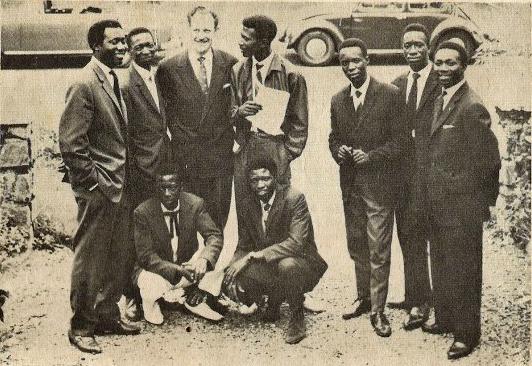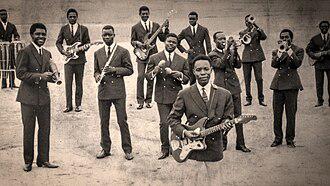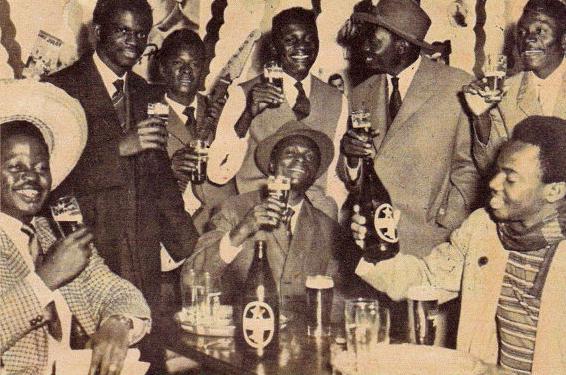In the common memory of the Cold War and wider global anti-colonial struggles, conflict is often only discussed in either military or intellectual terms, resulting in a loop of covering armed struggles such as the Vietnam War (1955-1975) or the propaganda campaigns of the US, USSR and Non-Aligned movement to win the hearts and minds of global audiences. While these battlefields, armed and ideological, are indeed key to understanding this epoch, attention must be called to the fronts beyond this binary. Notably, music stood to be a particular area of contention, wherein opposing ideas of social organization, nationalism and sovereignty fought between sheet notes, and struggled within lyrical prose. To this end, the following blog will cover the journey of Congolese Rumba and through time into the modern day, highlighting an enduring Congolese wish for unity, peace, and independence despite its utilisation by Mobutu and the Kabilas for political gain.
Rumba itself originates across the Atlantic in Cuba, springing to life as a mixture of folk music from Spanish slavers and African captives taken to the island colony to fulfil its harsh production quotas. Of these slaves, 70% were trafficked from the Congo River basin, adding a distinct African foundation to the new musical style. Rumba found its way back to the Congo in the 1930s, as colonial officers hired Cuban bands such as ‘Orquesta Aragon’ to entertain them while they occupied their posts. Rumba Lingala, or Congolese Rumba, was born shortly following interactions between Rumba and Congolese music, melding the related styles into a musical common ground between Congolese people and Black diasporas. As stated by author Bob W. White in his article ‘Listening Together, Thinking Out Loud’, popular culture such as films, music and literature can act like a “coherence machine” for collective memory, providing groups with the tools to mobilize memory beyond the abstract into political consciousness without the lengthy individual process of unravelling the social world. Therefore, Rumba Lingala became a means through which Congolese communities could come to terms with their treatment and call for the unity and independence they desired, altering the organization of Rumba Lingala from original Rumba to better reflect these messages. In terms of lyricism, Rumba Lingala was originally exclusively sung in the four principal national languages of the DRC (Lingala, Kiswahili, Tshiluba and Kikongo), challenging the colonial imposition of the French language through asserting and popularising the use of their own. Generally, Rumba Lingala challenged colonial authority, encouraging a Congolese identity that ran along national rather than ethnic lines to combat colonial ‘divide and conquer’ tactics that had pitted groups such as the Kuba, Luba and Tetela against one another. Rumba Lingala sought to stimulate sentiments of shared destiny among the Congolese community, binding warring groups together to better campaign against colonial rule. To push this messaging, compositions were notedly repeated within songs to emphasise ideological messaging and ensure points made were hammered in. Observably, Rumba Lingala also has a marked loyalty to single tonality, close harmonies reflecting a desired sense of national Congolese community within songs themselves through providing all aspects of the music with equal footing. Congolese Rumba often relies on the use of call and response within its lyricism, construing a running dialogue on independence and unity and inviting audiences to join in on conversation. To highlight their progressive orientation, many Rumba bands called themselves jazz bands, a symbol of modernity and an explicit wish to maintain solidarity with Black Americans and other marginalised groups who had popularised Jazz. As it got more popular, Rumba Lingala’s liberationist messaging quickly spread through communities via a combination of utilising radio technology and “La Conjecture” – the Congolese social activity wherein communities listen to music together, making the messaging and organisation of music a much more communal matter. Resultantly, it was music before any propaganda campaign which popularised ideas of Congolese national liberation among the masses, keeping ideas of a unified and free Congo fresh within the minds of all the Congo’s people. Congolese Rumba slowly began to influence the music of other independence movements, showcased by E.T Mensah’s “Ghana Freedom” (1957) which incorporated Rumba Lingala’s iconic guitar patterns, Latin-style horns and call-and-response vocals into African Highlife to celebrate Ghana’s recent independence from the British. Furthermore, similarly to many Rumba Lingala songs which directly referred to independence movement leaders, ‘Ghana Freedom’ uses call-and-response vocals to mimic conversation about Nkrumah, construing him as the people’s leader and a hero of Ghana. Through this, Congolese Rumba had inseparably attached itself to African nationalist expression, becoming the musical foundation for anti-colonialist songs. Rumba Lingala’s political prowess was fully realised during the Year of Africa 1960, as Le Grand Kallé and L’African Jazz released the song “Indépendance Cha Cha” to celebrate the imminent independence of Congo. Indépendance Cha Cha became extremely popular and was lauded as the “First Pan-African hit” following its huge successes in French Congo and the rest of Francophone Africa and use by countries such as Rwanda for their respective independence celebrations. Over the years, Rumba Lingala had managed to establish itself as a powerful instrument of change and political consciousness, which unfortunately, following the Congo Crisis (1960-1965) increasingly began being appropriated by regimes to legitimate themselves in the eyes of the people for their own ends.
In the early years of the Second Republic, Mobutu launched his ‘Authenticité’ campaign, wherein the last vestiges of colonial influence would be cast aside, and a singular African Congolese culture would flourish through promoting African cultural values, names and titles, symbolised by Mobutu’s own name change from Joseph-Désiré Mobutu to Mobutu Sese Seko Koko Ngbendu Wa Za Banga. However, Mobutu found himself desperately needing to stabilise public opinions of him and his regime following his betrayal of Lumumba to Katangese forces during the Congo Crisis. Moving quickly to declare Lumumba as the First National hero of the Congo to placate present public outrage, Mobutu foresaw a route for legitimising himself as the next hero of the Congo through music, harnessing the influence of Congolese Rumba for his own gain. Bands such as O.K. Jazz were commissioned to create songs perpetuating controlled messages that positioned Mobutu in favourable lighting. Songs began to increasingly push both Pro-Lumumba and Pro-Mobutu messages, artificially establishing Mobutu as the destined successor of Lumumba and someone who could be trusted to continue his excellent work. This allowed Mobutu to lift opinion of him by attaching it to the much more popular figure in Lumumba, and better his standing as Ruler of the Second Republic. Going further, Rumba Lingala songs began to tie Mobutu to the idea of the Congolese nation itself, portraying the nation as a family in political organisation. This resultantly bound Mobutu’s rule and the Congolese nation together, falsifying a sense of essentiality to Mobutu’s rule to ensure the prosperity of the Congolese nation and demonising those who criticised the regime through likening it to betraying family. While efforts to stabilise his rule through music had empowered Mobutu, the success of propaganda through music became a double-edged sword to the Second Republic, as musicians gained enough political power not just to promote Mobutu, but implicitly criticise his rule, making music one of the few safe spaces for anti-Mobutu messages. Nevertheless, Mobutu managed to successfully harness the political influence of Congolese Rumba to solidify his rule and position within the Second Republic of Congo.
The trend of music as a political tool, albeit utilised on a much lower level, branches further into the Congo under the Kabilas, who endorsed musicians with political power in return for favourable songs. The best example of this is the late “Queen of Mutuashi” Tshala Muana and her relationship with both Kabila presidents. Tshala Muana rose to fame for her distinct style of Congolese Rumba, singing mostly in her native language of Tshiluba and dancing Mutuashi, the traditional dance of the Luba people as part of a loving promotion of her people’s culture in the wider world of Rumba Lingala. Muana often used her music as a platform for advocacy, giving the poor a voice and pushing for the rights of women and children. Through this, she preserved the original espousing properties of Rumba, while reapplying the centres of espousal to modern issues. Her most popular song “Lekela Mwadi” (1996) serves as a great example of this, speaking about the significant role women play in Congolese society, promoting women’s rights and achievements in the late years of Mobutu’s regime, where such discourse was obstructed by the enforcement of traditional silent, domestic roles for women. Notably, the lyrics portray the Congo in the microcosm of a village, depicting women as anchors of village community and therefore, Congo at large, mimicking pro-Mobutu motifs of the Congo as a village community for advocacy. Muana sings about often keeping things running politically and socially fall to women, making them instrumental to the survival of society. The line “Mukaji mufua bintu bibombe” – “when a woman dies, things fall apart” entrenches ideas of women as vital to Congolese society, highlighting the great loss to societal foundations when women die or are endangered. Muana was nominated into parliament by Laurent Kabila, fostering a lifelong loyalty to the Kabilas through their political support of her subsequent movements to enhance and protect the rights of women and children. Muana’s loyalty to the Kabila regime stood strong as power passed from Laurent to Joseph Kabila, with a lot of her following songs such as “Kabila very strong” pushing Pro-Kabila messages. Despite mass boycotts of her concerts in response to her support of Kabila, Muana maintained mass influence over Congolese music, helping to popularise Pro-Kabila sentiment even after his successor Felix Tshisekedi stepped forward. This ironically came back to bite her in 2020, when she was arrested due to her song “Ingratitude” having anti-Tshisekedi lyrics in it, claiming Tshisekedi had been an ungrateful mentee to Joseph Kabila and had strayed from the path preset by his predecessors. The following ban of the song from local radio stations proves that Muana’s messaging was deemed influential enough to be a risk to Tshisekedi and his regime, highlighting the continued prevalence of music in influencing Congolese politics.

Today, the sway of music over Congolese politics remains strong and Rumba Lingala remains a vehicle for voicing political strife, now often taking the form of samples for Congolese rap, as seen with Lexxus Legal and his Rumba backed hip-hop songs which criticise the current conditions of the Congo and call for social change. In 2023, the Amani festival in Bukavu featured a myriad of songs, some Congolese Rumba, to call for peace and reconciliation for areas affected by the recent conflict, especially Goma, where the festival was originally held, but had to be relocated due to M23 occupation. The festival provided young people with a chance to express their concerns and wishes, giving a voice to the underrepresented youth and once again displayed the survival of Rumba Lingala’s original function in franchising the disenfranchised.
Rumba Lingala, through the ages of the DRC, has shown its strength as a haven for anti-colonial dissent and defined itself as a herald of change, pushing for Congolese unity and peace. Despite tampering from several politicians, namely Mobutu, the core message of freedom and co-operation in the Congo has stood strong, allowing Congolese Rumba to remain an influential anti-colonial tool in current times. The music style’s evocative lyrics, use of call-and-response vocals and equal footing given to all aspects of a song has helped foster a common idea of Congolese community and disseminate the wishes of the people often left without a voice in the political world. If we are to take anything away from the continued impact of Rumba Lingala over Congolese politics, it’s that the voices of the people will be heard no matter what, if not in parliament than on the streets, and if not then, then it will find a home between the notes of music.
Written by Alex Temmink


